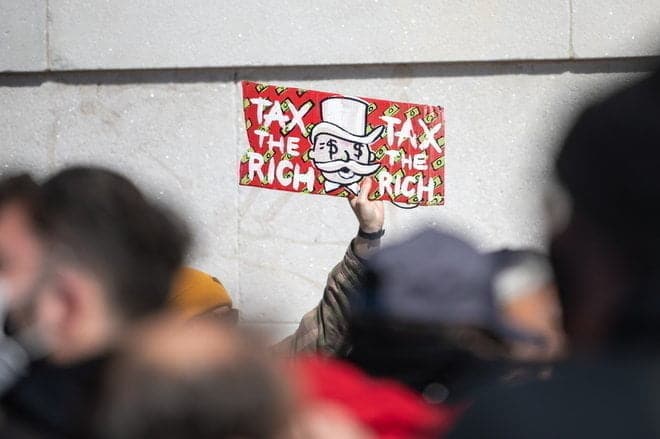This year’s presidential race has unfolded like a made-for-TV drama, with twists and turns aplenty. But no matter who wins the White House or Congress, a giant tax fight awaits them next year — when many of the 2017 Trump tax cuts for corporations and the rich expire.
Part of that fight will be about closing loopholes the very wealthy use to pay lower tax rates than teachers or custodians. But let’s not forget the Wall Street high rollers who gamble in our markets, putting everyone’s investments at risk.
One proposal that could make waves is a Wall Street tax — also called financial transaction tax, or FTT — on stock, bond, and derivative trades. Think of it as a small sales tax for Wall Street trades, like the taxes the rest of us pay when we buy shampoo or shoes.
My organization, Public Citizen, was one of over a hundred that signed a recent letter to Congress calling for meaningful tax reform that fairly generates more revenue and creates more inclusive economic growth.
And I’m here to say an FTT would check all of those boxes and more.
Just a 0.1 percent tax — that’s 10 cents on every $100 of stocks, bonds, and derivatives trades — would generate an estimated $752 billion over 10 years. That would be more than enough to cover free universal preschool, free community college, and national paid family and medical leave — combined.
In addition to a boon for revenue, an FTT would also be a win for tax fairness, since the bulk of it would be paid by the very wealthy, who own and trade the vast majority of stocks.
READ: A Fair Tax Agenda for Wall Street
FTTs are a tried and true solution that many other nations have used to generate significant revenues from the very wealthy and put them into public programs for all — which is why the FTT is often called the “Robin Hood tax.” It could do the same thing in the United States, reinvesting those revenues into creating a more level playing field.
Another benefit? An FTT would tame high-frequency trading, where computer programs ping-pong trades in the blink of an eye, which allows them to get in front of slower moving traders and eke out a miniscule profit on each trade. Because of the volume of trading these firms engage in, all of those tiny profits stack up to huge paydays.
These high-frequency trading algorithms tend to follow each other, somewhat like lemmings throwing themselves off a cliff. That can wreak havoc in the market, as it did during the 2010 Flash Crash when $1 trillion was lost in the U.S. markets in a matter of minutes.
Even a tiny tax on all those trades would make that computer-driven, high-frequency trading less desirable — which would make our markets safer.
Given that it’s a win-win idea, many prominent voices favor taxing Wall Street trades. Former Treasury Department officials like Robert Rubin, Antonio Weiss, Kim Clausing, and Natasha Sarin support taxing financial transactions. Jared Bernstein, who chairs the U.S. Council of Economic Advisers, also supports FTTs.
With these financial all-stars backing the proposal — and even some conservative voices weighing in in favor of taxing Wall Street trades — FTTs deserve their time in center stage during the upcoming 2025 tax fight.
This op-ed was distributed by OtherWords.org.






